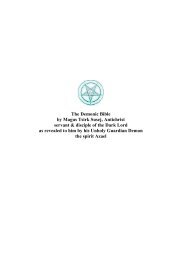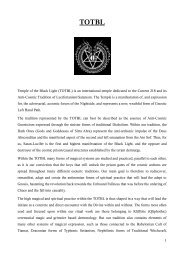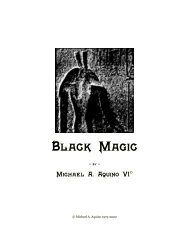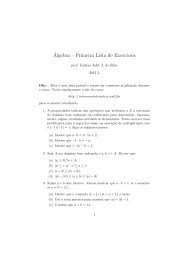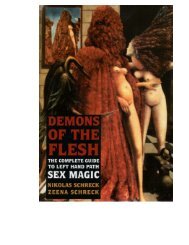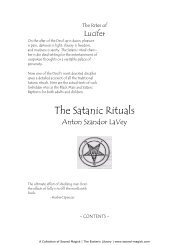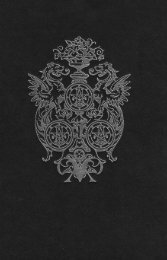- Page 1:
SATANISM TODAY AN ENCYCLOPEDIA OF R
- Page 4 and 5:
Copyright 2001 by James R. Lewis Al
- Page 6 and 7:
vi Contents Black Roses, 29 Blake,
- Page 8 and 9:
viii Contents N Near-Death Experien
- Page 11 and 12:
INTRODUCTION Even though times have
- Page 13 and 14:
Introduction xiii imagery was also
- Page 15:
Introduction xv however, following
- Page 18 and 19:
2 Abraxas as conceived by Crowley i
- Page 20 and 21:
4 Ahriman chip cookies. He then ope
- Page 22 and 23:
6 Angel Heart symbols are widely us
- Page 24 and 25:
8 The Anticult Movement stages, opp
- Page 26 and 27: 10 Apparition Edward Kelly summons
- Page 28 and 29: 12 Aquinas, Thomas ing through into
- Page 30 and 31: 14 Aquino, Michael A. demons who, t
- Page 32 and 33: 16 Ascendancy Book of Ephesians:
- Page 34 and 35: 18 Azazel light of glory. The syste
- Page 36 and 37: 20 Baphomet (Sigil of Baphomet) out
- Page 38 and 39: 22 Bardo Thödol (The Tibetan Book
- Page 40 and 41: 24 Beast of the Yellow Night about
- Page 42 and 43: 26 Belphegor directing the tolling
- Page 44 and 45: 28 Black Mass Holy Bible, and audib
- Page 46 and 47: 30 Bless the Child own designs for
- Page 48 and 49: 32 Bosch, Hieronymus Bosch’s Gard
- Page 50 and 51: 34 Buddhism acknowledged to exist,
- Page 52 and 53: 36 Builders of the Adytum BOTA is v
- Page 54 and 55: 38 Cathars Anton LaVey lists candle
- Page 56 and 57: 40 Cattle Mutilations working out o
- Page 58 and 59: 42 Cerberus theorists in the 1980s,
- Page 60 and 61: 44 Charleroi Case from the thinking
- Page 62 and 63: 46 Chick Publications that multitud
- Page 64 and 65: 48 China force their beliefs on the
- Page 66 and 67: 50 Church of Satan Church of Satan
- Page 68 and 69: 52 Church of Satanic Liberation Cen
- Page 70 and 71: 54 The Craft Jungian perspective. T
- Page 72 and 73: 56 Curse of the Demon and is the pr
- Page 74 and 75: 58 Curses destruction; drawings, pa
- Page 78 and 79: 62 Dante’s Inferno feels lost in
- Page 80 and 81: 64 Demiurge numerical value—a gem
- Page 82 and 83: 66 Demons In Christianity, the anci
- Page 84 and 85: 68 Descent into the Underworld Desc
- Page 86 and 87: 70 The Devil’s Bride John Milton,
- Page 88 and 89: 72 Diabolus in Musica (his italics)
- Page 90 and 91: 74 Dungeons and Dragons Dungeons an
- Page 93 and 94: E Egypt The ancient Egyptians origi
- Page 95 and 96: Egypt 79 The Set and Osiris story u
- Page 97 and 98: Enochian Magic 81 Book of Enoch is
- Page 99 and 100: Ereshkigal 83 different time period
- Page 101 and 102: The Exorcist 85 be invoked by name,
- Page 103 and 104: F Fallen Angels In theology, the Fa
- Page 105 and 106: Film 89 sad it is! I shall grow old
- Page 107 and 108: Flight 91 the lake that burns with
- Page 109 and 110: Fraternity of the Hidden Light 93 S
- Page 111 and 112: G The Gate and Gate 2 The Gate, a 1
- Page 113 and 114: God, The Devil And Bob 97 scientifi
- Page 115 and 116: Grimoire 99 Although many young peo
- Page 117 and 118: H Hades In the contemporary period
- Page 119 and 120: Halloween 103 body, which is consid
- Page 121 and 122: Heavy Metal Music 105 According to
- Page 123 and 124: Heavy Metal Music 107 AC/DC, 1977 (
- Page 125 and 126: Hell and Heaven 109 “The Torments
- Page 127 and 128:
Hermetic Order of the Golden Dawn 1
- Page 129 and 130:
Hinduism 113 an Exclusive Plymouth
- Page 131 and 132:
Hinduism 115 between 200 B.C.E. and
- Page 133 and 134:
Hinduism 117 not mean that South As
- Page 135:
Humor 119 that hell has a monopoly
- Page 138 and 139:
122 Incubi and Succubi demonic equi
- Page 140 and 141:
124 Indo-Europeans to all vices. An
- Page 142 and 143:
126 Ingram Ritual Abuse Case To put
- Page 144 and 145:
128 Invitation to Hell January 3, 1
- Page 146 and 147:
130 Islam restored into it, and tas
- Page 148 and 149:
132 Jinn Samuel. Its Structure in R
- Page 150 and 151:
134 Johnson, Robert vernacular musi
- Page 152 and 153:
136 Judaism and Hebrew Scriptures b
- Page 154 and 155:
138 Judaism and Hebrew Scriptures a
- Page 156 and 157:
140 Judgment of the Dead soul is ju
- Page 158 and 159:
142 Kiss of Shame on them; upon whi
- Page 160 and 161:
144 LaVey, Anton Szandor God’s, w
- Page 162 and 163:
146 LaVey, Anton Szandor expertise
- Page 164 and 165:
148 Left Behind human or animal uri
- Page 166 and 167:
150 Leviathan Leviathan (Dover Pict
- Page 168 and 169:
152 Lisa and the Devil, a.k.a. The
- Page 170 and 171:
154 Luciferian Children of Satan fo
- Page 173 and 174:
M Magic and Magical Groups Widespre
- Page 175 and 176:
Manichaeism 159 issue of accepting
- Page 177 and 178:
Manson, Charles 161 Charles Manson
- Page 179 and 180:
Mark of the Devil 163 “Pricking a
- Page 181 and 182:
Matamoros Murders 165 Two of the ce
- Page 183 and 184:
Mather, Cotton 167 A close up of th
- Page 185 and 186:
Mathers, Samuel Liddell 169 execute
- Page 187 and 188:
McMartin Ritual Abuse Case 171 pare
- Page 189 and 190:
Mesoamerica 173 Richardson, James,
- Page 191 and 192:
Milton, John 175 For Further Readin
- Page 193 and 194:
Mind Control, Satanic 177 sonalitie
- Page 195 and 196:
Monastery of the Seven Rays 179 A 1
- Page 197:
Mr. Bubbles Case 181 See also Crime
- Page 200 and 201:
184 Neopagan Witchcraft encounterin
- Page 202 and 203:
186 Neopagan Witchcraft Part of a W
- Page 204 and 205:
188 Netherworld Mesopotamian area i
- Page 206 and 207:
190 Nightmares sentencing, such ind
- Page 208 and 209:
192 Nimrod Nowhere is this suspicio
- Page 210 and 211:
194 The Ninth Gate The Ninth Gate I
- Page 212 and 213:
196 Order of Nine Angles Free Thoug
- Page 214 and 215:
198 Ordo Templi Orientis For Furthe
- Page 216 and 217:
200 Ordo Templi Satanas threw out a
- Page 219 and 220:
P Pact with the Devil It is a most
- Page 221 and 222:
Palo 205 [signed:] Satan, Beelzebub
- Page 223 and 224:
evidence could be found among other
- Page 225 and 226:
Possession and Exorcism 209 that ta
- Page 227 and 228:
Possession and Exorcism 211 the ora
- Page 229 and 230:
Possession and Exorcism 213 A 12th
- Page 231 and 232:
The Process 215 exorcism, although
- Page 233 and 234:
Procter and Gamble 217 Mouthwash &
- Page 235 and 236:
Purgatory 219 awaited the final jud
- Page 237 and 238:
R Rabid Grannies At a family gather
- Page 239 and 240:
Rand, Ayn 223 purpose of implanting
- Page 241 and 242:
Rivera, Geraldo 225 A number of oth
- Page 243 and 244:
Robin Hood Hills Murders 227 This i
- Page 245 and 246:
Rosemary’s Baby 229 United States
- Page 247 and 248:
S Sabbat A persistent item of medie
- Page 249 and 250:
Sacrifice 233 with their backs turn
- Page 251 and 252:
Salem Witchcraft 235 Xango Afro-Bra
- Page 253 and 254:
Salvation 237 William Phips establi
- Page 255 and 256:
Satanic Reds 239 Satan Satan’s na
- Page 257 and 258:
Satanic Ritual Abuse 241 people so
- Page 259 and 260:
Satanic Ritual Abuse 243 assigned t
- Page 261 and 262:
Séance 245 Victor, Jeffrey. Satani
- Page 263 and 264:
Shakespeare 247 Semyaza Semyaza (al
- Page 265 and 266:
The Shawnee The dominant type of cr
- Page 267 and 268:
Shemhazai and Azazel 251 target-per
- Page 269 and 270:
Stay Tuned 253 were able to gain kn
- Page 271 and 272:
T Tales from the Hood Inspired by t
- Page 273 and 274:
Temple of Set 257 the Temple of Set
- Page 275 and 276:
Torment of the Damned 259 White Sox
- Page 277:
Trick or Treat This 1986 film, whic
- Page 280 and 281:
264 UFOs and Demons misfortunes on
- Page 282 and 283:
266 Underworld “The ‘E.T.’ Pl
- Page 284 and 285:
268 The United Kingdom, Ritual Abus
- Page 286 and 287:
270 The United Kingdom, Ritual Abus
- Page 288 and 289:
272 Virgil Virgil as Dante’s guid
- Page 290 and 291:
274 Vodoun (also Voodoo; Vodun) par
- Page 293 and 294:
W Walpurgisnacht According to Anton
- Page 295 and 296:
Wheatley, Dennis 279 the Book of Ge
- Page 297 and 298:
Wormwood 281 1. To bring about the
- Page 299 and 300:
Z Zoroastrianism In the history of
- Page 301 and 302:
CHRONOLOGY The following chronology
- Page 303 and 304:
Chronology 287 Creation of the Dung
- Page 305 and 306:
Chronology 289 with 190 counts of p
- Page 307 and 308:
APPENDIX I: Sample Documents A reli
- Page 309 and 310:
Appendix I: Sample Documents 293 an
- Page 311 and 312:
Appendix I: Sample Documents 295 gr
- Page 313 and 314:
Appendix I: Sample Documents 297 th
- Page 315 and 316:
APPENDIX II: 1992 FBI Study of Sata
- Page 317 and 318:
Appendix II: 1992 FBI Study of Sata
- Page 319 and 320:
Appendix II: 1992 FBI Study of Sata
- Page 321 and 322:
Appendix II: 1992 FBI Study of Sata
- Page 323 and 324:
Appendix II: 1992 FBI Study of Sata
- Page 325 and 326:
Appendix II: 1992 FBI Study of Sata
- Page 327 and 328:
Appendix II: 1992 FBI Study of Sata
- Page 329 and 330:
Appendix II: 1992 FBI Study of Sata
- Page 331 and 332:
Appendix II: 1992 FBI Study of Sata
- Page 333 and 334:
Appendix II: 1992 FBI Study of Sata
- Page 335 and 336:
Appendix II: 1992 FBI Study of Sata
- Page 337 and 338:
Appendix II: 1992 FBI Study of Sata
- Page 339 and 340:
Appendix II: 1992 FBI Study of Sata
- Page 341 and 342:
APPENDIX III: Satanist Survey In th
- Page 343 and 344:
Appendix III: Satanist Survey 327 S
- Page 345 and 346:
Appendix III: Satanist Survey 329 M
- Page 347 and 348:
Appendix III: Satanist Survey 331 r
- Page 349 and 350:
Appendix III: Satanist Survey 333 w
- Page 351 and 352:
Appendix III: Satanist Survey 335 c
- Page 353 and 354:
Resources Print Resources Abyeta, S
- Page 355 and 356:
Resources 339 Davidson, H. R. Ellis
- Page 357 and 358:
Resources 341 ———. Our Haunte
- Page 359 and 360:
Resources 343 Paul, William. Laughi
- Page 361 and 362:
Resources 345 Wolfe, Burton H. The
- Page 363 and 364:
Index Aaron, 18, 136 and Mastema, 1
- Page 365 and 366:
Index 349 Belphegor, 26. See also D
- Page 367 and 368:
Index 351 and Lilith, 151 and limbo
- Page 369 and 370:
Index 353 and Belphegor, 26 and Bos
- Page 371 and 372:
Index 355 Flight, 91-92. See also D
- Page 373 and 374:
Index 357 Homer, 101-102, 140 Horus
- Page 375 and 376:
Index 359 and Stygian Grotto of the
- Page 377 and 378:
Index 361 Minshull, Elizabeth, 175
- Page 379 and 380:
Index 363 Plants and amulets, 6 Pla
- Page 381 and 382:
Index 365 Satan Speaks (LaVey), 146
- Page 383 and 384:
Index 367 “Sympathy for the Devil
- Page 385:
Index 369 Yahweh, 64, 73, 96, 149,




